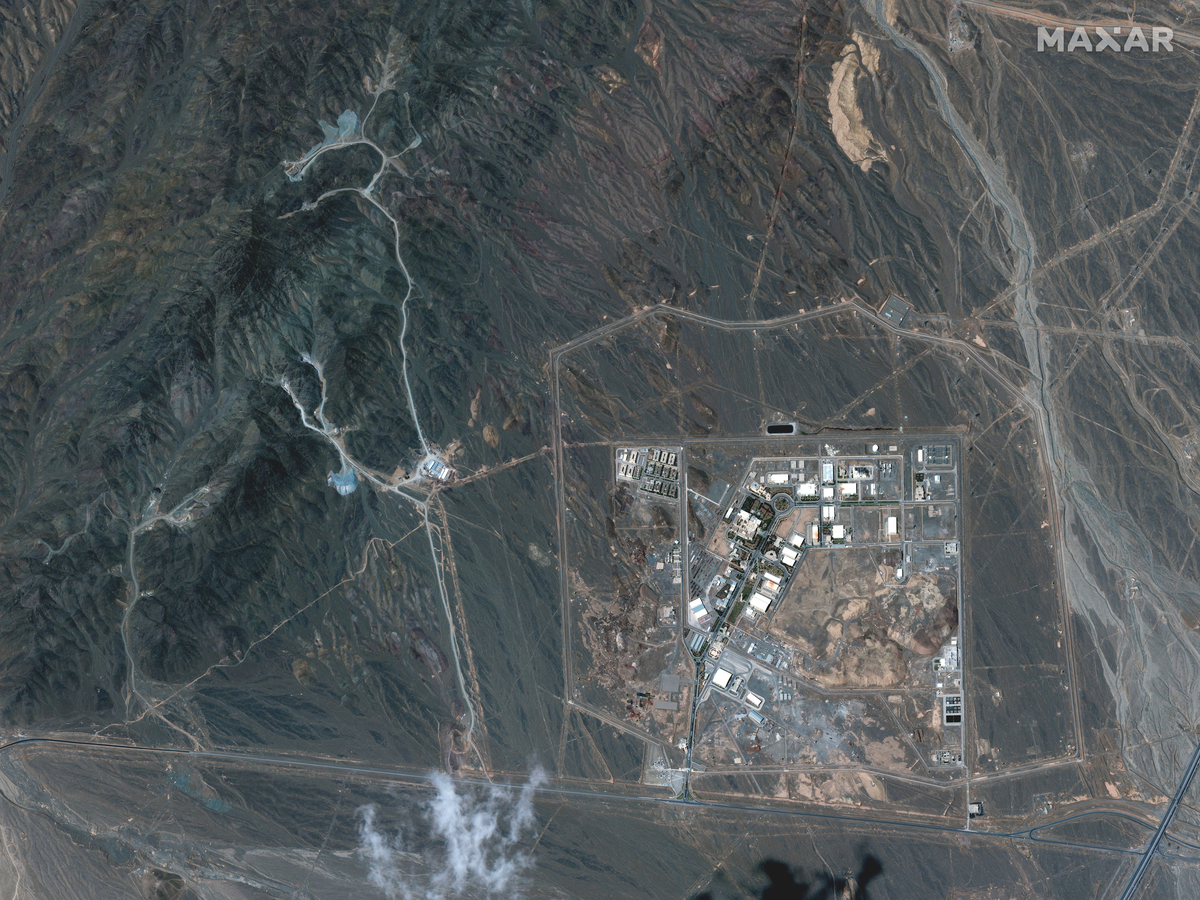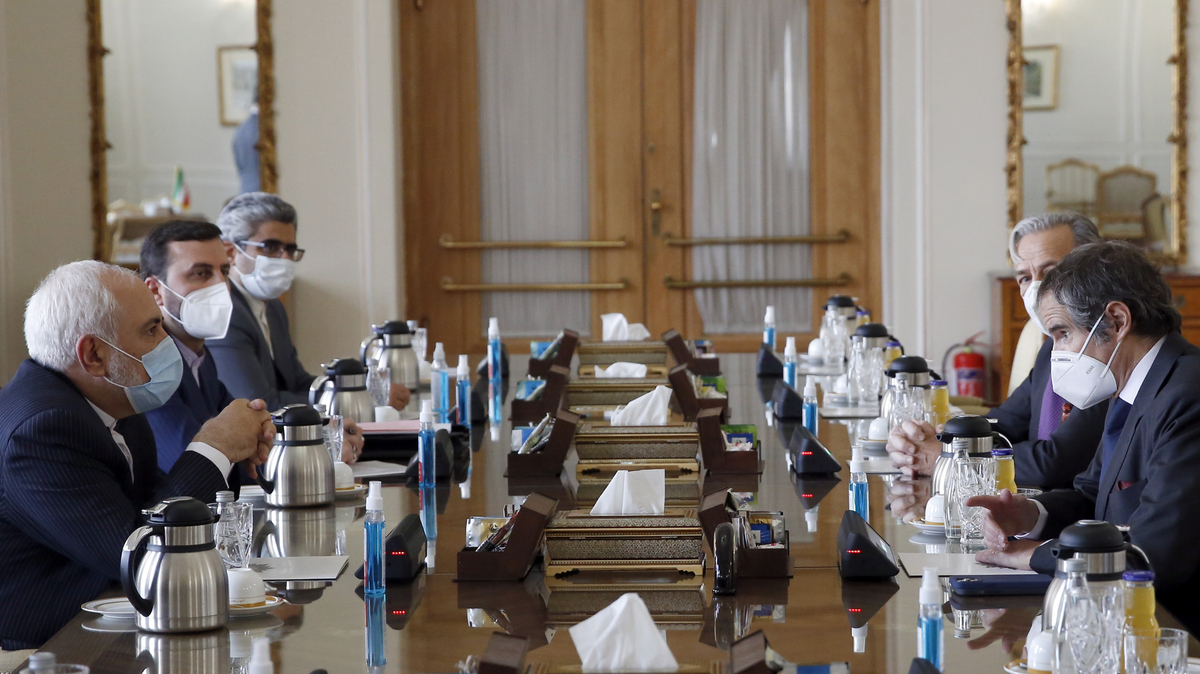What Did The Irans Do With Their Returned Money From Obams Nuclear Deal

A staff person removes the Iranian flag from the phase afterward a group motion picture with representatives of the United States, Iran, China, Russia, Great britain, Germany, France and the European Marriage during the Iran nuclear talks in July 2015 in Vienna. Carlos Barria/Pool/AFP via Getty Images hide caption
toggle caption
Carlos Barria/Puddle/AFP via Getty Images

A staff person removes the Iranian flag from the phase after a group movie with representatives of the United States, Iran, Prc, Russia, Great britain, Germany, France and the European Wedlock during the Iran nuclear talks in July 2015 in Vienna.
Carlos Barria/Pool/AFP via Getty Images
Both the Biden assistants and Iranian leaders say they want to revive the 2015 nuclear agreement. But they're stalled over who should take the first steps — or make the first concessions — to become in that location.
This calendar week European, Russian and Chinese partners in the understanding volition mediate talks in Vienna to try to bring Iran and the U.S. back in. The talks officially first Tuesday and could have days or multiple rounds.
The U.South. State Department expressed guarded optimism in a statement Friday, maxim, "These remain early days, and nosotros don't anticipate an immediate breakthrough every bit there will exist difficult discussions ahead. Merely nosotros believe this is a salubrious pace frontward."
Recall that in the deal, the United States and other world powers lifted economic sanctions on Islamic republic of iran. The most important were U.S. bans on companies doing business with Iran or countries ownership its oil. In return, Iran agreed to limit its nuclear plan and immune inspectors to monitor information technology from the inside.
But former President Donald Trump pulled out and reimposed sanctions — even toughening them. In plow, Iran started ramping its nuclear program back upwardly, edging closer to making the kind of radioactive fuel that could be used in weapons.
At present, as the Biden administration and Iran argue over who should make the first move — that is, the U.Due south. removing sanctions or Iran dismantling some of its nuclear equipment — in that location's risk of greater disharmonize. Already in Feb, U.S. officials said Islamic republic of iran-backed militias were backside sporadic rocket attacks on American troops in Iraq, and President Biden ordered a retaliatory airstrike on a militia.
Here'due south a review of how we got here:
The 2015 deal
Iran has long said it has a peaceful nuclear energy programme. Just by 2015 it was getting shut to mining and processing enough of the specialized uranium needed for a flop. The U.S., Germany, France, Britain, Russian federation, Red china, the United Nations and European Matrimony fabricated a deal lifting economic sanctions on Iran, giving it access to billions of dollars in frozen avails information technology needed to revive its ailing economy.
In render, Islamic republic of iran tore out some of its nuclear equipment, permit Russian federation cart out its uranium and allowed inspectors from the International Atomic Energy Bureau, or IAEA, to set upwards shop in Iran and install cameras in the nuclear facilities that Iran said it has.
Iran as well freed some foreigners being held there in return for Iranians held in the United States.
In that location were critics of the Obama administration's understanding to the deal. They pointed out that most of the restrictions would stage out around 2026. And they noted the bargain didn't limit Islamic republic of iran's nonnuclear missile program — seen as a threat to the region — or accost human rights violations and Iran's support for militant groups.
Backers of the deal countered it would be easier to work with Islamic republic of iran on those regional problems if the country doesn't accept the leverage that comes with nuclear weapons. The bargain set back and froze Iran's efforts to produce enough enriched uranium for a nuclear bomb. The IAEA and Trump's defence secretary said Islamic republic of iran was complying with the deal.
Trump said the deal wasn't tough enough and, merely as he reversed numerous other Obama White Business firm policies, he broke from the deal in 2018 — breaking the U.S. commitment — and reimposed layers of sanctions.
The sanctions' effect
Soon deals that U.S. companies had wanted to practice with Iran — such equally a Boeing plan to sell information technology airliners — were quickly blocked. And the restrictions didn't end with U.Southward. companies. Even though other countries didn't want to impose sanctions, the U.S. threatened to punish their companies if they did business organisation with Iran. For example, if a French company wanted to invest in Iran, information technology could become cutting off from using American banks or doing business in the giant U.S. economy. That scared off international merchandise with Islamic republic of iran.
The U.South. worked especially hard to block Iranian oil sales — past far the land's biggest consign — cut them at least by half and reducing much of the trade in oil that continues to cashless castling or under-the-table arrangements.
The U.Southward. wasn't able to get other countries to shut downwards all trade, only the Iranian economy shrank by more than than 10%, driving up unemployment and poverty. And though the U.Due south. exempted medicine from the sanctions, international companies fear that trading medical appurtenances with Iran could nevertheless run afoul of U.S. laws. Iranians complain of critical shortages.
The nuclear program now

A satellite epitome shows an overview of construction around Iran'south Natanz nuclear facility on Saturday. Maxar Technologies hide caption
toggle caption
Maxar Technologies

A satellite image shows an overview of construction around Iran's Natanz nuclear facility on Sat.
Maxar Technologies
Iran scaled back its nuclear program as part of the agreement, reducing both its stockpiles of nuclear textile and the equipment available to make more than.
When the Trump administration withdrew from the deal in 2018 and reimposed sanctions that had been lifted, Iran said information technology no longer was leap by the agreement. Islamic republic of iran began to reconstitute its plan slowly, increasing its stockpiles of enriched uranium and reinstalling equipment it had mothballed. It announced these steps to the earth — at one bespeak promising to accept a new step every calendar month until sanctions were lifted. Iran's parliament passed a police urging the government even to end the international inspections at the heart of the deal.
When the deal had been in identify, Iran was roughly a year abroad from getting the material information technology would need for a nuclear weapon, should it choose to pursue one. As of Feb, some estimates now put that time scale at as little every bit three months.
Opponents and spoilers
Leaders in both the U.S. and Iran will face pushback at abode if they reenter the deal. Later years of bashing by Trump, many Americans believe the bargain was besides easy on Islamic republic of iran. And after the U.S. abandoned its commitments in the bargain, many Iranians have given up on the prosperity they once expected the deal to bring. "At the cease of the mean solar day, both sides are going to have to accept that at that place'southward going to be a political cost that they volition have to pay if they want to get a deal," Trita Parsi of the Quincy Institute for Responsible Statecraft recently told NPR's Forenoon Edition.
Simply there are other spoilers out there. Iranian hard-liners — such as the country'south powerful Revolutionary Baby-sit Corps — have long opposed closer relations with the West. The Guard supports some of the Iraqi militias blamed for rocket attacks on U.South. troops.
And there are U.S. allies — State of israel and Saudi arabia in particular — that view Iran every bit an existential threat and fear what it could do with the billions of dollars information technology would get from oil sales and other new business.
Though information technology did comply with the nuclear agreement before the U.S. pulled out, Iran still fabricated provocative moves. It took captive of some foreigners, continued developing its powerful conventional missile program and aided the repressive government in Syrian arab republic and the Houthi rebels that overthrew Republic of yemen'south pro-Saudi authorities.

Iranian Foreign Minister Mohammad Javad Zarif (left) meets with Rafael Grossi (correct), managing director full general of the International Diminutive Energy Agency, in February in Tehran. After Iran threatened to suspend inspections, the agency and Iran agreed to keep some verification activities going. STR/AFP via Getty Images hide caption
toggle explanation
STR/AFP via Getty Images

Iranian Foreign Government minister Mohammad Javad Zarif (left) meets with Rafael Grossi (right), director general of the International Atomic Free energy Agency, in February in Tehran. After Iran threatened to suspend inspections, the agency and Islamic republic of iran agreed to keep some verification activities going.
STR/AFP via Getty Images
Getting dorsum in — who goes first?
Biden campaigned on promises to rejoin the nuclear deal — and lift sanctions — when Islamic republic of iran complies with it again. And Iran says it will comply as before long as the U.S. starts letting information technology do business organization over again. Only they're stuck.
Before this week's talks were announced, the assistants had sought directly talks with Iran about how to practice this. It indicated it might wait to verify Iran's compliance before lifting sanctions.
Iran seemed to view that as an attempt by the U.S. to delay lifting sanctions or to change the original deal, making it a piffling stronger or longer — something that would help the deal go down better politically in America. "The entire nuclear deal is nonnegotiable considering it was fully negotiated," Iranian Foreign Minister Mohammad Javad Zarif told CNN. "We need to implement something that we negotiated. Nosotros do not buy the horse twice." Islamic republic of iran said it will bring its plan into compliance once it's sure the U.Due south. has lifted sanctions.
Now the U.S. has agreed to attend the circular of talks without coming together direct with Iran — merely letting mediators shuttle between them.
There are ways around this the logjam. Sanctions are circuitous and could be eased 1 by one, releasing frozen money, while Iran takes steps to cut back its nuclear program again. But information technology will accept political will on both sides and could become tougher the longer it takes — especially since Iran has presidential elections in June that hard-liners could win.
Geoff Brumfiel contributed to this study.
Source: https://www.npr.org/2021/04/05/983405544/reviving-the-iran-nuclear-deal-heres-what-it-involves-and-why-its-hard
Posted by: kennedysence1957.blogspot.com

0 Response to "What Did The Irans Do With Their Returned Money From Obams Nuclear Deal"
Post a Comment